Greek Poets of Late Antiquity (10 vols.)
Digital Logos Edition
This product has been transferred from Community Pricing to Pre-Pub. The actual funding level may be lower than it appears, which could delay production. The amount of funding still needed will be evaluated and updated soon.
Overview
Poetry provides a window into a culture’s mythology and values, as well as its people’s daily lives. The Greek Poets of Late Antiquity Collection brings together significant works by Quintus Smyrnaeus, Nonnos, Oppian, Colluthus, and Tryphiodorus. In The Fall of Troy, Quintus Smyrnaeus writes in the spirit of Homer, continuing from where The Iliad left off. Nonnos, in The Dionysiaca—the longest surviving poem from antiquity—decadently describes the adventures of the Greek god Dionysus. In Halieutica, Oppian writes about fishing in vibrant detail. Colluthus’ The Rape of Helen recounts the story of Paris and Helen, and Tryphiodorus’ The Taking of Ilios details the capture of Troy. These valuable volumes contain a wealth of culture and lore expressed with the elegance of poetry.
This collection contains the complete texts in their Loeb Classical Library editions. Each text is included in its original Greek, with an English translation for easy side-by-side comparison. Logos’ language tools help you go deeper into the Greek text and explore the poets’ elegant language. Use the dictionary lookup tool to examine difficult Greek words and find every appearance of the same word in your library. Students of history, culture, literature, and Greek will enjoy these works and appreciate their significance.
Key Features
- Poems by five great Greek poets
- Artistic descriptions of mythology, lore, and culture
- Loeb Classical Library editions
Product Details
- Title: Greek Poets of Late Antiquity
- Authors: Quintus Smyrnaeus, Nonnos, Oppian, Colluthus, and Tryphiodorus
- Translators: Arthur S. Way, W. H. D. Rouse, and A. W. Mair
- Series: Loeb Classical Library
- Publisher: Harvard University Press and G. P. Putnam’s Sons
- Volumes: 10
- Pages: 3,122
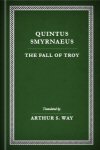
This volume contains Arthur S. Way’s English translation of The Fall of Troy. Written in 14 books, the text continues from the closing of Homer’s Illiad. Quintus recounts stories of Penthesilea—the Amazonian queen, Memnon—leader of the Ethiopians, the death of Achilles, the arrival of Philoctetes, and the making of the wooden horse. The poem concludes with the departure of the Greeks, and the storm that wrecked their fleet.
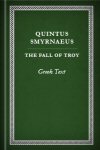
This volume contains the Greek text of The Fall of Troy. Written in 14 books, the text continues from the closing of Homer’s Illiad. Quintus recounts stories of Penthesilea—the Amazonian queen, Memnon—leader of the Ethiopians, the death of Achilles, the arrival of Philoctetes, and the making of the wooden horse. The poem concludes with the departure of the Greeks, and the storm that wrecked their fleet.
Quintus Smyrnaeus was a Greek epic poet. He lived during the third century AD.
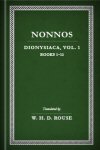
Dionysiaca, vol. 1: Books 1–15
- Author: Nonnos
- Translator: W. H. D. Rouse
- Series: Loeb Classical Library
- Publisher: Harvard University Press
- Publication Date: 1940
- Pages: 303
This volume contains W. H. D. Rouse’s English translations of books 1–15 of the Dionysiaca, an epic poem about Dionysus. The poem details the Greek god’s adventures, including his conquest of India. At 20,426 lines, it is the longest surviving poem from antiquity.
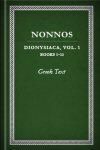
Dionysiaca, vol. 1: Books 1–15: Greek Text
- Author: Nonnos
- Series: Loeb Classical Library
- Publisher: Harvard University Press
- Publication Date: 1940
- Pages: 303
This volume contains the Greek text of books 1–15 of the Dionysiaca, an epic poem about Dionysus. The poem details the Greek god’s adventures, including his conquest of India. At 20,426 lines, it is the longest surviving poem from antiquity.
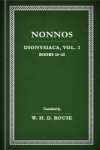
Dionysiaca, vol. 2: Books 16–35
- Author: Nonnos
- Translator: W. H. D. Rouse
- Series: Loeb Classical Library
- Publisher: Harvard University Press
- Publication Date: 1940
- Pages: 290
This volume contains W. H. D. Rouse’s English translations of books 16–35 of the Dionysiaca, an epic poem about Dionysus. The poem details the Greek god’s adventures, including his conquest of India. At 20,426 lines, it is the longest surviving poem from antiquity.
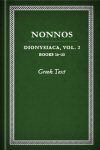
Dionysiaca, vol. 2: Books 16–35: Greek Text
- Author: Nonnos
- Series: Loeb Classical Library
- Publisher: Harvard University Press
- Publication Date: 1940
- Pages: 290
This volume contains the Greek text of books 16–35 of the Dionysiaca, an epic poem about Dionysus. The poem details the Greek god’s adventures, including his conquest of India. At 20,426 lines, it is the longest surviving poem from antiquity.
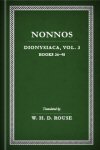
Dionysiaca, vol. 3: Books 36–48
- Author: Nonnos
- Translator: W. H. D. Rouse
- Series: Loeb Classical Library
- Publisher: Harvard University Press
- Publication Date: 1940
- Pages: 274
This volume contains W. H. D. Rouse’s English translations of books 36–58 of the Dionysiaca, an epic poem about Dionysus. The poem details the Greek god’s adventures, including his conquest of India. At 20,426 lines, it is the longest surviving poem from antiquity.
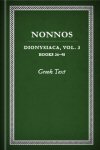
Dionysiaca, vol. 3: Books 36–48: Greek Text
- Author: Nonnos
- Series: Loeb Classical Library
- Publisher: Harvard University Press
- Publication Date: 1940
- Pages: 274
This volume contains the Greek text of books 36–58 of the Dionysiaca, an epic poem about Dionysus. The poem details the Greek god’s adventures, including his conquest of India. At 20,426 lines, it is the longest surviving poem from antiquity.
Nonnos was a Greek poet who lived in Egypt during the fifth century AD. His epic poem, the Dionysiaca, is regarded as the last great poem of antiquity.
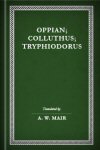
Oppian, Colluthus, Tryphiodorus
- Authors: Oppian, Colluthus, and Tryphiodorus
- Translator: A. W. Mair
- Series: Loeb Classical Library
- Publisher: G. P. Putnam’s Sons
- Publication Date: 1928
- Pages: 366
This volume contains A. W. Mair’s English translations of poems by poets Oppian, Colluthus, and Tryphiodorus. Included in this volume are Oppian’s Cynegetica and Halieutica, Colluthus’ The Rape of Helen, and Tryphiodorus’ The Taking of Ilios. A. W. Mair also provides a summary of the poets’ lives.
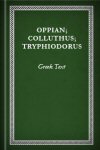
Oppian, Colluthus, Tryphiodorus: Greek Text
- Authors: Oppian, Colluthus, and Tryphiodorus
- Series: Loeb Classical Library
- Publisher: G. P. Putnam’s Sons
- Publication Date: 1928
- Pages: 366
This volume contains the Greek text of poems by poets Oppian, Colluthus, and Tryphiodorus. Included in this volume are Oppian’s Cynegetica and Halieutica, Colluthus’ The Rape of Helen, and Tryphiodorus’ The Taking of Ilios.
Oppian of Corycus lived during the reign of Emperor Marcus Aurelius (AD 161–180). After disrespecting one of Aurelius’ colleagues, Oppian’s father was sent into exile. Oppian followed his father, but later returned to Rome where he presented his poems to Aurelius. Aurelius was impressed with his talent and offered him a piece of gold for each line of poetry and pardoned his father. He is credited with the authorship of Halieutica. Translator A. W. Mair believes that Cynegetica was written by a different author, in imitation of Oppian’s style.
Colluthus was a Theban poet who lived during the late fifth and early sixth century AD. The Rape of Helen is his only surviving work.
Tryphiodorus was a Greek poet and grammarian who lived in Egypt during the third or fourth century AD. The Taking of Ilios is his only surviving work.